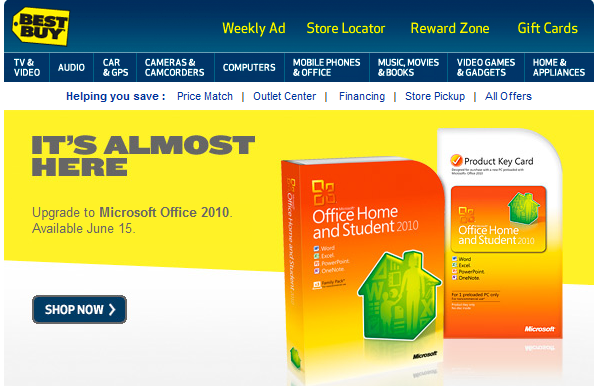Retail customers: Do your Office Starter 2010 homework

June 15 marks the date that Office 2010 goes on sale via retail. While many company watchers and potential users are more focused on the Webified version of Microsoft's Office suite (Office Web Apps), Microsoft and its partners are paying equally close, if not closer, attention to Office Starter 2010.

Some have described Office Starter 2010 as trialware (or crapware, depending on your preference of terms). That's not far off the mark. Office Starter is the new vehicle via which Microsoft is preloading an entry-level version of its latest Office suite on new PCs, with the hopes that users will be interested enough to pay to upgrade to a full-fledged version.
Microsoft officials are not entirely convinced their Office Starter 2010 plan is going to work. I had a chance to see a note Microsoft sent to some of its OEM partners, outlining Office 2010 marketing restrictions and suggested best practices.
Some interesting excerpts from that note:
"Most customers who purchase a PC install a full Office suite on it within two weeks. Focusing on the full Office suites also helps avoid dissatisfaction from customers expecting a full Office suite or from business users who miss the functionality of the full Office suites.
"Incorrect messaging of Office Starter 2010 may discourage your customers from purchasing a full Office suite and could also lead to customer dissatisfaction and confusion. Market research shows that many people confused Office Starter 2010 with a full Office suite, and were then dissatisfied because they believed they had received a full Office suite."
Microsoft is advising its PC and retail partners not to focus end-user advertising on Office Starter 2010. Why? From the aforementioned note: "(R)esearch shows that advertising or promoting Office Starter 2010 will distract your customers and deter them from purchasing a full Office suite."
Instead, Microsoft is advising its retail partners to focus on the idea that new PCs preloaded with Office 2010 are "ready for activation" with the purchase of a product key card or disc.
As I blogged previously, Microsoft also is using Office Starter 2010 to get more of its own software and services preloaded on new PCs. Microsoft is planning to charge PC makers $2 per copy for Office Starter 2010 if they also agree to preload the Bing Bar and Windows Live Essentials. If a PC maker wants Office Starter 2010 only, Microsoft plans on charging $5 per copy.
Here's a screen shot below that reinforces this planned pricing, and notes that Microsoft is selling these bundles in packs of 10 to its OEM/system builder partners.
June 15 also is the date when Microsoft has said it plans to begin rolling out to users the new Windows Live Wave 4 Hotmail. It is the Wave 4 version of Hotmail that will enable users to share Office Web Apps documents from inside their -mail. Microsoft "turned on" Office Web Apps last week, enabling users to access the Webified versions of Word, Excel, PowerPoint and OneNote via their Windows Live Skydrive storage service.